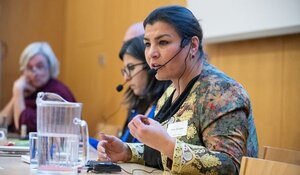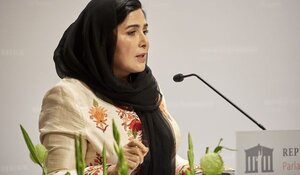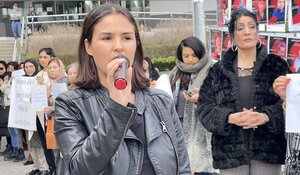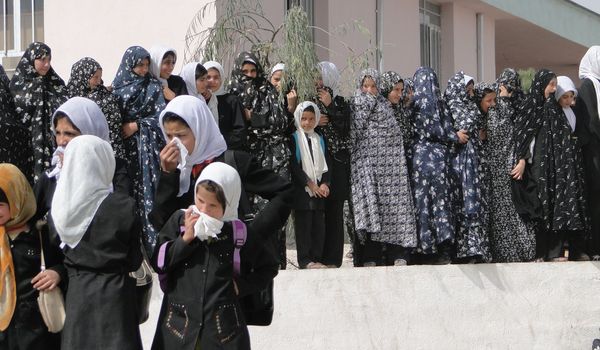Under Taliban's oppressive regime, which came to power in August 2021, women have been effectively stripped of their rights and freedom. The Taliban's strict interpretation of Islam dictates that women should adhere to a strict dress code, are also banned from working outside the home, attending school, and participating in public life. This has had devastating consequences for women in Afghanistan, many of whom were able to access education and employment opportunities after 2001.
Severe restrictions on women
The Taliban's restrictions on women's freedom of movement have also made it difficult for them to access healthcare and other essential services. Many women are unable to leave their homes without a male escort, making it nearly impossible for them to seek medical attention. Meanwhile Taliban dissolving all the laws including the constitution of Afghanistan as well as the institutions that once protected women against violence including domestic violence made it impossible for women to report incidents of domestic violence. This has only exacerbated the already difficult situation that women are living in.
Furthermore, women in Afghanistan also face heightened risks of violence and discrimination under the Taliban. The Taliban's strict enforcement of its interpretation of Sharia law has led to an increase in incidents of violence against women, including forced marriages, honour killings, and other forms of gender-based violence (GBV). Because of the lack of any legal framework that can protect the women against violence including absence of institutions that once were mandated to protect women and girls such as the Ministry of Women Affairs (MoWA), the Family Response Units and the GBV prosecutors’ offices, women in Afghanistan more than any other time are at risk

The impact of the Taliban's restrictions on women's participation in the workforce have had devastating consequences on women’s economy. Many women who were once able to support themselves and their families through employment are now unable to do so, leading to increased poverty and hardship. The lack of financial independence also leaves women vulnerable to exploitation and abuse, as they are often dependent on male relatives for support. One of the women who was a prosecutor before August 2021 told me “The most difficult part of my life is that I have to ask my husband to pay me to buy sanitary pads, or toiletries and sometimes I can’t even buy those as there are other priorities such as buying food or medicine for my children.
Gender persecution and gender apartheid
The Taliban's strict enforcement of gender norms and patriarchal attitudes perpetuates a culture of oppression and misogyny that limits women's autonomy and agency which is amounting to gender persecution and gender apartheid. This made Afghanistan the lowest rank in the "2023 Women, Peace and Security Index" (Georgetown Institute for WPS). Women who defy these norms or challenge the status quo are at risk of facing severe punishment, including imprisonment, public floggings, or even death.
Afghanistan under Taliban rule is the only country in the entire world that is restricting women to access education and employment. The Taliban's ban on girls' education has forced millions of young women to drop out of school, denying them the opportunity to fulfil their potential and contribute to society. Education is a fundamental right that empowers women and girls to break the cycle of poverty and inequality, and its denial is a significant setback for the progress of women's rights in Afghanistan.

Despite the oppressive conditions imposed by the Taliban, women in Afghanistan have demonstrated remarkable resilience, courage, and determination in the face of adversity. Despite the severe restrictions on their rights and freedoms, Afghan women are finding ways to resist the Taliban's oppressive regime and advocate for their rights in various ways. From running underground and online schooling, to provide skills-building classes, creating even small opportunities where they can.
Heroines opposing Taliban’s brutal regime
Young women like Parasto Hakim (euobsever) who run a number of underground and online schooling for young girls named Srak. She is among many other brave women who are taking the matters in their hands and doing what they can to change the situation. Hakim is a 25 years old women rights activist from Afghanistan who has also been a nominee of the Sakharov Prize (European Parliament) as a recognition for her struggle on promoting girls’ education in Afghanistan. Also women like Tamana Paryani who is leading a campaign in Germany for the recognition of gender apartheid as a crime under the international law. She is another young Afghan woman activist who was kidnapped by the Taliban along with her three sisters in Kabul on 19 January 2022 because of her protests against the Taliban. She and her sisters endured horrific forms of torture while they were detained by the Taliban where they spent 40 days without due process. Taliban denied their arrest as the international condemnation and pressure increased over the group’s act of cruelty (BBC News). Since her release, she is continuing to fight for gender equality and recognition of gender apartheid as a crime under the international law.

Meanwhile, there are other women who are working under-ground to provide support and protection to the women victims of domestic abuse, to support vocational and skills building for women and girls in Afghanistan such as the women’s rights activist Suraya Pakzad. In 1998 she founded the organization Voice of Women (VWO), which began by teaching girls to read and later was able to offer women's shelters for victims of violence until they were forced to close down by Taliban’s takeover in 2021. Pakzad was evacuated to Germany - VIDC Global Dialogue and the Danish Refugee Council have made great efforts for her liberation.
Many other women also use social media to amplify their voices and share their stories with the world. Many Afghan women have used platforms like X, Facebook, and Instagram to document the human rights abuses they are facing under Taliban rule, raise awareness about their plight, and call for international support. These digital platforms have provided a vital space for Afghan women to connect, organize, and mobilize for their rights, despite the risks involved.

In addition to their online activism, Afghan women are also engaging in grassroots organizing and advocacy efforts to resist the Taliban's oppressive policies and promote gender equality. Women-led organizations and civil society groups in Afghanistan are working tirelessly to provide support and resources to women and girls in need, including legal assistance, healthcare services, and education programs. These organizations are at the forefront of the fight for women's rights in Afghanistan, advocating for gender equality, women's empowerment, and the protection of women's rights at a great cost including revoking of their registration, arrest of their staff members, closure of the organization, confiscation of their offices, threats and harassment.
Many men also stood up for the rights of Afghan women particularly for the right to education at great personal costs such as Matiullah Wessa who served nine months in Taliban detention for his peaceful campaign on education is among dozens of other men who are fighting for the rights of women and girls in Afghanistan.
Demands on the international community and Austria
- Provide humanitarian aid: The international community and the government of Austria must prioritize providing humanitarian aid and assistance to women and girls in Afghanistan.
- Advocate for women's rights: continue to advocate for the protection of women's rights in Afghanistan and support our call for the recognition of gender apartheid as a crime under the international law.
- Fund women-led organizations and civil society groups that are working to advance gender equality, women's empowerment, and the protection of women's rights in Afghanistan.
- Provide asylum and resettlement opportunities: Many Afghan women rights activists and protesters are at risk of violence, persecution, under the Taliban regime and are in urgent need of resettlement.
- The Austria government should prioritize supporting initiatives that advance women's education, skills training, and economic empowerment in Afghanistan, including scholarships, vocational training programs, and job placement services.
- Amplify Afghan women's voices: It is crucial that the international community amplifies the voices of Afghan women and supports their efforts to speak out against oppression and advocate for their rights. (15 March 2024)

